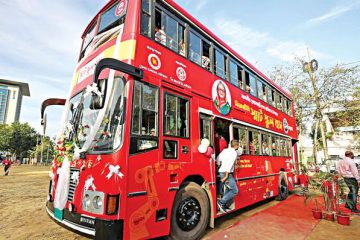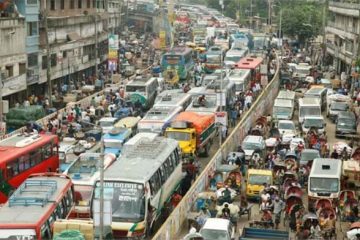‘Shantir Swapney: Samayer Smriticharan’
Gen Moeen explains how martial law was averted
Staff Correspondent
 It sounded like a veiled threat to Army Chief General Moeen U Ahmed when envoys of some powerful countries told him, prior to 1/11 changeover, that they would request the UN to withdraw Bangladeshi peacekeepers if the army cooperates in holding the elections, which was scheduled for January 22, 2007, without participation of all parties.
It sounded like a veiled threat to Army Chief General Moeen U Ahmed when envoys of some powerful countries told him, prior to 1/11 changeover, that they would request the UN to withdraw Bangladeshi peacekeepers if the army cooperates in holding the elections, which was scheduled for January 22, 2007, without participation of all parties.
“The thought of its consequences sent a chill through me, as the UN could not ignore their request,” General Moeen said in his book titled ‘Shantir Swapney: Samayer Smriticharan’ (Dream for peace: Reminiscence of time) published last week.
The 384-page book contains accounts of the days during the political turmoil before 1/11, army’s role and his own experiences in those critical days alongside his reminiscence about his childhood and student and professional life.
About the consequences of the threat, Gen Moeen wrote, “The soldiers who earn a fixed income can only look forward to the UN mission. If this opportunity is taken away, it will be difficult to control them. At the same time, the image of the Bangladesh army in the peacekeeping mission would be tarnished if the peacekeepers are withdrawn.”
During the days of political turmoil when the army naturally became the focus of all attention, the army chief said, the people were ready to welcome the martial law, but he never wanted to involve the army in state affairs.
“I deeply felt the nation was eagerly looking at me… Ambassadors of different countries asked about my plans… But I firmly told them politicians have created the problem. Let them find out the solution,” he continues.
A sense of frustration was also prevailing in the army, he notes, recalling the events of November 6 and 7 in 1975 when soldiers took to the streets with arms, violating the army discipline.
The pressure on him was mounting as the four-party alliance was sticking to its stance of holding the election on January 22 and the grand alliance opposing it, putting the country at risk of anarchy, Gen Moeen said, adding that the army was misguided in the past, but they could not follow suit this time.
The army chief said he had spent sleepless nights in the run-up to 1/11. “The scenes of anarchy, vandalism in the streets and the cry of helpless people on television… I got tired of thinking of what I need to do to bring peace,” Moeen continues. However, it was his patriotism, respect to democracy and loyalty to the state that kept him calm, he adds.
At that time, Gen Moeen questioned himself whether any of his moves to save the country would go against Khaleda Zia or would be tantamount to an act of betrayal. Then he himself had the answer — nothing is more important than protecting the country during the period of national crisis.
It was January 10, 2007. A circular was issued empowering the army to arrest any lawbreakers without warrants. To Moeen, it sounded like putting the army against the people.
At that time, pressure from inside and outside the country was high on him to halt the electoral process, Gen Moeen says. The intelligence sources also informed him that the army officers of all ranks were opposed to their involvement in such an election.
In the afternoon, the telephone operator told him that the UN Peacekeeping Mission Undersecretary General John Mary wanted to talk with him. “I then realised that the threat to the future of our peacekeepers is going to be a reality.”
On January 11, 2007, the army chief got up early in the morning and prayed to the Almighty to guide him the right way. He went to the office earlier than schedule. He then received a call from the UN Peacekeeping Mission undersecretary who told him that the election without participation of all political parties would not be acceptable to the UN.
“The UN will seriously consider withdrawing the Bangladesh peacekeepers from the UN missions, if Bangladesh Army plays any role in such an election,” said the UN official.
“After receiving the warning, it was not difficult for me to realise that the involvement of the army in such an election would make the role of Bangladesh Army controversial,” Gen Moeen wrote in his book.
“The reputation that the Bangladesh Army gained at home and abroad since the ’90s was about to be destroyed. Apart from that, the army will also have to take the responsibility of any possible civil war if the elections are held. I, as the Chief of Army, could in no way accept it.”
General Moeen then talked with the chiefs of Bangladesh Navy and Air Force regarding the overall situation in the country and the UN stance on election. They agreed to meet President Iajuddin Ahmed and explain the situation to him.
Thousands of questions arose in his mind about the possible reaction of the president. The president might be angry with them and give order to arrest them, shoot or remove him from the post, Moeen says in his book. “But, I am an optimistic person. I thought he would take an appropriate decision.”
Before heading for Bangabhaban, Gen Moeen informed CGS Major General Iqbal Karim Bhuiyan of everything, asking him to tackle the situation initially in the event of his not returning from there.
“I also told him to be ready to see me in civil dress if the president disagrees with our proposals,” Moeen writes. “I started from the Army Headquarters at 2:00pm.”
Incidentally, all the chiefs of the three services entered the Bangabhaban together. The president was then at lunch. They waited for the president for about an hour and then they were called into the sitting room at 4:00pm.
“I informed the president of the latest situation, electoral issues, the ultimatum of the grand alliance, and the UN’s and foreign countries’ stance on the elections. The chiefs of the Navy and Air Force also explained the gravity of the situation. Brigadier General Bari of DGFI also explained that the country might see fierce violence if they go ahead with the elections on January 22.”
They discussed with the president that to overcome the crisis, there were three options — firstly, holding election as per schedule; secondly, declaring martial law and holding elections in a convenient time and thirdly, declaring a state of emergency without suspending the constitution and holding the election as soon as possible for restoring democracy.
As per the first option, the dangers were that election without participation of all political parties would be questionable, which could lead to conflicts and put the army against people, and finally the risk of withdrawal of Bangladeshi peacekeepers from the UN mission. Besides, there were also fears of major shake-up in the army, Gen Moeen says.
Secondly, the army was against the martial law and there is no acceptability of martial law worldwide. Besides, the country would move backward as the consequences of martial law, Gen Moeen writes. “We, therefore, put forward the third option. The president listened to us carefully, but did not make any comments.”
After a long pause, the president wanted some more time to decide. “I knew earlier that many good decisions of the advisory council were changed for reasons unknown. So, we did not want to give any chance to any vested quarters. The room then plunged into pin-drop silence. Finally, the president agreed to declare a state of emergency countrywide.”
Courtesy: thedailystar.net


















